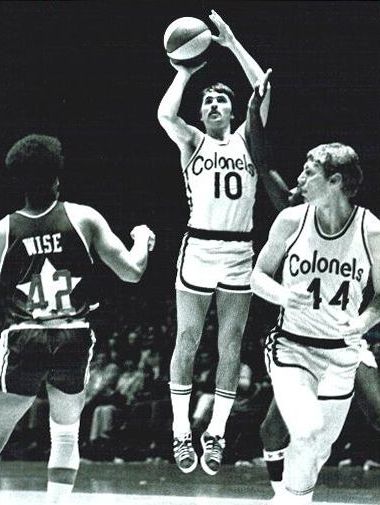Louie Dampier
Teams
Kentucky Colonels (ABA) - 1967-76
San Antonio Spurs - 1976-79
Playoffs
Appearances - 12 (1968,1969,1970,1971,1972,1973,1974,1975,1976,1977,1978,1979)
Conference Finals - 6 (1970,1971,1973,1974,1975,1979)
ABA Finals - 3 (1971,1973,1975)
ABA Championships - 1 (1975)
Awards and Honors
All-ABA First Team - 0 (1969,1970)
All-ABA Second Team - 4 (1968,1969,1970,1971,1974)
Hall of Fame - 2015
All-Time Ranks
Total Assists - #82
League Leads
Three Point Percentage (#1-1974, #2-1970,1975,1976, #4-1969,1971,1972, #5-1973)
Total Assists (#3-1969,1972,1974,1976, #4-1970,1973, #5-1975)
Assists Per Game (#3-1969,1973,1974, #4-1972,1976, #5-1970)
Three-Pointers Made (#1-1969,1970, #2-1971, #3-1972,1973)
Total Points (#3-1969, #4-1970)
Points Per Game (#3-1969, #4-1970)
Louie Dampier was a 2-time All-American at the University of Kentucky, and an Academic All-American, and played on the losing side in one of the most famous college basketball games of all time, when the all-white Kentucky team lost to Texas Western, who were the first national champs with an all-black starting lineup. Following graduation, Dampier was drafted in the 4th round by the Cincinnati Royals, but he chose to take an offer from the Kentucky Colonels of the brand-new ABA instead.
Dampier was an immediate star in the ABA, making the All-ABA Second Team after averaging 20.7 points as a rookie. He was even better in his second season, putting in 24.8 points per game to go along with 5.8 assists, and led the league with 199 3-pointers made, which ended up as the all-time ABA record for a season.
The next season he remained one of the best players in the league, leading the league in 3-pointers again while falling a single shot short of his record from the previous season, and he averaged an amazing 26.0 points per game, 4th-best in the league. He also led the Colonels to the Conference Finals, which would be a common occurrence over the next several years.
In 1970, the Colonels drafted Dan Issel, another University of Kentucky star, who took over as the star of the team as a rookie, with Dampier settling into a sidekick role. The duo worked well together, leading the Colonels to the ABA Finals, where they fell in 7 games to the Utah Stars.
The next season, the team drafted Artis Gilmore, who immediately supplanted Issel as the team's star, winning both the Rookie of the Year and MVP awards, and the threesome led Kentucky to the ABA's best record ever, finishing at 68-16, but they were upset in the conference semifinals, once again falling short of the ultimate prize despite an extremely strong team.
Kentucky was able to return to the ABA Finals in 1973, but they again fell in 7 games, this time to the Indiana Pacers. Dampier led the entire league in three-point percentage the next year, after ranking in the top 5 in that stat in each of the previous 5 seasons, but they still weren't able to break through in the playoffs, falling in the conference semis again.
Dampier finally won his championship in 1975, the penultimate season of the ABA. By this point, his scoring had slipped to a still-respectable 16.8 per game, and he was still the #3 star on the team behind Gilmore and Issel, but he was still a very important part of the title team. The ABA lasted only one more season, and the Colonels were among the teams that folded, with Dampier being selected by the San Antonio Spurs in the dispersal draft.
Dampier played 3 seasons with the Spurs as the backup to George Gervin, but never made much of a mark in the NBA, as he was past his prime by the time the merger happened. Still, he is one of the all-time greats of the ABA. He is the ABA's all-time leader in many statistical categories, including points scored, assists, minutes played, and three-pointers made.
He reached the Conference Finals only once as the star of his team, with 4 more appearances happening after he took a slightly reduced but still large role, and it was in that role that he became a champion. He is among the greatest players in the history of the ABA, and though he is not well-known today, he still deserves to be remembered among the greatest basketball players of all time.



No comments:
Post a Comment